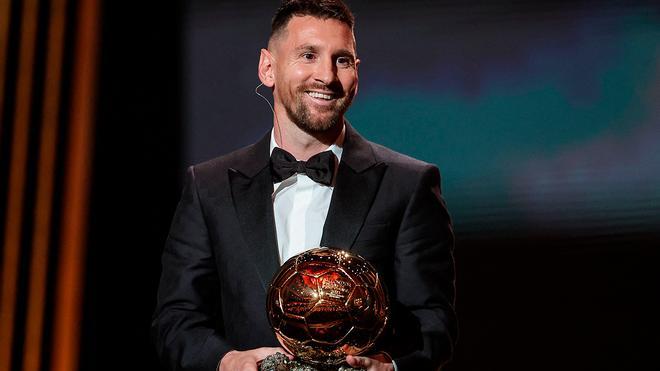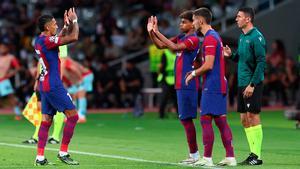Former La Masia star Adama Traore: "They wanted me to join street gangs"
The Wolves forward spoke to SPORT about life growing up in L'Hospitalet and the lessons it taught him
La Florida de l’Hospitalet is one of the most populated neighbourhoods in Europe. It was here where Adam Traore grew up as his family, like many others, came to Catalunya in search of a better life. He now plays for Wolverhampton Wanderers and will face Espanyol, at Cornella, and gave an exclusive interview to SPORT about his past and also the present.
Who do you call first when you finish a match?
My family. I usually call my parents.
What have they told you about their arrival to Spain?
My dad came here when he was 23-25 and stayed with a family. He worked for a few years and when he felt more settled, with his own house and work - for Nissan - he brought my mother, who was a cleaner.
You were born in Hospitalet?
I was born in Barcelona, in la Maternidad, next to Camp Nou. I spent almost all of my life in Hospitalet in a place called Bloques (de la Florida). It's a village with a lot of people from other countries, immigrants, with various different cultures. My brother and I started playing football in the street with our friends, in los Bloques, where a lot of gipsies lived.
In street squares or on a pitch?
It was a 5-a-side pitch in the middle of los Bloques, but it isn't there anymore. My brother and I were known because I had played for Barça and he for Espanyol. Everyone in the area wanted to play against us. There were people who came from Santa Eulalia, Collblanc, from all over. We held a small tournament, our team against everyone else. As we kept winning, people would say: "Hey, there are two brown kids who are really good" and more teams would come to try and beat us.
Were you aware of how that mixed both cultures with sport?
To be honest, yes. My parents enrolled us in football because they wanted us to work on our discipline involved in sports. I liked that and was focused on it. In the area I grew up there were plenty of fights, gangs and other problems. Us - my brother and the group we played football with - didn't care what gang you belonged to or your background, football united us all.
Was your team made up of people from all over?
There was a mixture. My old friends and I played with gipsies, some Morrocans, a few Dominicans, Spaniards and other Africans. Whoever looked good you wanted in your team. The atmosphere was good, everyone brought their drinks. To get into the match you gad to know someone but once you were in, there weren't any problems. Sometimes we even had a referee in case there were any arguments.
Why aren't their more professionals from the gipsy community or from African origins? Don't they want to become professionals or are they not allowed?
I don't know about not letting them become professionals. I thank God and the people who helped me because a professional, but it also depends on what you want from life. It could be easier or more difficult, depending on each person's situation, but if you really want something and work for it, little by little it becomes a reality.
Were you ever tempted to join a gang?
Yes, yes, yes. A lot of times. Me, my brother, a Dominican friend, everyone. In this time being part of a gang was something which made you popular. But we had a different mentality, we wanted to be footballers and not part of some gang - and didn't want to fight. You saw fights almost every day.
Did you see any fights?
I was in fights! Yes, of course. In the school I went to there were gangs. They fought amongst each other constantly. They've done a great job in Hospitalet and everything is a lot calmer now.
Did you also see guns?
I saw them and also fights with bats, knives, bottles.. everything.
I'm from Barcelona and it feels like you are talking about another country.
Yeah, I know. A lot of times when we left Hospitalet and showed our DNI (identity card), so they knew where we came from, they wouldn't let us in the clubs. That isn't right because I'm an example that where you were born doesn't define you. It's about how you are brought up, what your mentality is and the objectives you have.
Did you still visit Hospitalet?
Of course. The pitch isn't there but I would like to put one there someday. It's good for youngsters to focus on other things, healthy things, like sport. We compete, win or lose, we take away the prize (sometimes even bets) and life stopped at that moment.
Do you remember a really good player who joined a gang and left football?
A lot of them. I've played with and against them in los Bloques and they were incredible. But they stopped to sell drugs, to join gangs or because or relationships. The gangs controlled different areas. Depending on where you were going they'd ask: "What gang are you in? Where do you live? Why are you here?" If they didn't know you, or even if you didn't have any problem with you, it could become an issue. So for some people they got angry and joined a rival gang. That happened a lot. That's why it's complicated and you need to know what you want, to remain focused on that. Wherever you come from, even if it's a rough neighbourhood, there are always good people who know what they want to do.
When you live in the street and mix with other cultures, do you mature quicker?
Yes, because you see everything. You see the fights, how they work, how a gang operates, or how the police investigate the gangs, how the streets work, how they move drugs. The most important thing is you need to make a decision quickly. For example, in a fight, you need to decide quickly whether you want to follow the same path, working hard, and doing everything legally. If you want to do it illegally, it's there, and you can get those things easier.
You must have thought quickly to decide that if you weren't going to have success in Barça, it would be elsewhere because you wanted to be a professional.
I had some problems with Barça that I prefer to keep to myself, but I didn't leave the best way. I had to make a decision. If Barça, a club I loved, didn't give me the opportunity or it wasn't the right time, I had to leave. I don't have any problem with going to Madrid. Barcelona is my home but my mentality is to be the best every day and what will happen, will happen.
Do they have to kick you out of gyms, just like Cristiano Ronaldo?
As a youngster, I was always fast but when I stopped, I suffered a lot. I had groin strains, tendonitis and I had to work on my muscles to be able to sustain my explosive way of playing. I started to do specific work. No weights, but I know people won't believe me. I work in the gym but it's different from what others do. They have to stop me because I always want to do more.
When you go to los Bloques and they see you, do they remember you or ask what you've done?
After a year away, I returned and they asked me: "What happened? How are you looking like that? You look so different!" And I told them that in English football it's what you need to do
Topics with the letter




